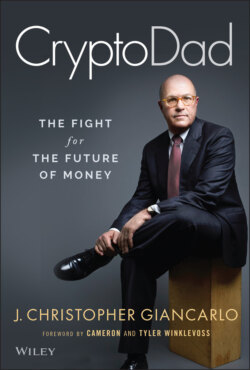Читать книгу CryptoDad - J. Christopher Giancarlo - Страница 36
Action by No Action
ОглавлениеA greater breakthrough came the following January 2016, almost a year after the white paper's publication. It was my first day back in Washington after Christmas break at our home in New Jersey. In the office, I met with my staff to hear their analysis of the agency's proposed individual permanent registrations for the first 18 Swap Execution Facilities. We went through each application. My staff counsel, Amir Zaidi, a rigorous lawyer and former analyst at the Federal Reserve Bank of New York, identified the different business models offered by each firm.
It quickly became apparent that the applications reflected a comprehensive range of business models. These included hybrid electronic and voice-based systems, mechanisms called “request for quote” and “central limit order books,” as well as fully electronic auction systems. Some of the applicants sought to serve primarily wholesale—or “sell side”—market participants, while others sought to serve both “sell-side” and “buy-side” players. Some of the SEFs focused on just a few types of swaps, while others planned to handle a wide range. It was clear that the staff had bent over backwards to allow SEFs to operate by “any means of interstate commerce” as Congress had promised in Dodd–Frank.
Though delighted with the result, I was disappointed by the elaborate, administrative procedure that produced it. That result was a fair amount of circumvention of the ill-conceived SEF rules. Those peculiar rules, by their terms, required SEFs to restrict their business models to just two means of interstate commerce: “request for quote” and “central limit order books.” CFTC staff were now recommending, however, approval of SEF registrations that allowed a broad set of trading methods. In my view, that was exactly the right outcome, because that was what Congress had always envisioned and specified in the language of the Act. But what a ridiculous, roundabout way to do the right thing.
The guts of the workaround hinged on conditioning SEF approvals on applicants' compliance with five staff letters, called “no-action letters.” Each letter effectively waived flawed swaps trading rules that I had identified in my white paper.
This was bad administrative law on several levels. First, rather than the CFTC lifting the inappropriate limits on SEF business models, the CFTC was just ignoring those limits. Second, the opaque mechanisms being used would make it very hard for other market participants to understand what modes of swap execution the CFTC was really permitting. Observers would have to pore over the fine print of each and every SEF registration that was approved and then extrapolate the unstated rules that were quietly being applied. Third, relying on a hodgepodge of “no action” letters would force market participants to jump through pointless hoops of make-work.
I told my staff I intended to issue a blistering public statement. I would declare that the whole thing was a sham and that “the Emperor had no clothes.”
Amir's face turned down. I asked why. He told me that market participants were sorely afraid of my doing so. Everyone knew that it was a charade to pretend that SEFs were being restricted in their business models when, in fact, they were being allowed to operate competitively. But the industry also knew that Dodd-Frank advocates needed to maintain the appearance that they were “cracking down” on Wall Street. If I was candid about what the staff had done, then Dodd–Frank proponents might have to profess shock and foist more restrictions on SEFs. In short, everybody was hoping that I would keep my mouth shut. I got the point.
So what had started with a bang was ending with a whimper. The CFTC staff had folded their tent on the flawed SEF rules. My white paper had served its purpose. I could not take credit, however, for a good outcome that no one wanted to admit had taken place. We had arrived at the right outcome but through the wrong means. The right means would have been for the commission to openly acknowledge that economic freedom, never having been abridged by Congress, could not be abridged by an unelected regulatory body like the CFTC.
The situation was not satisfactory in the long term. What the staff permitted today, it might not permit tomorrow. The only right thing to do would be to change CFTC rules. I would keep my mouth shut for now. But I made up my mind to try to change the rules in the unlikely event I ever got the chance.
